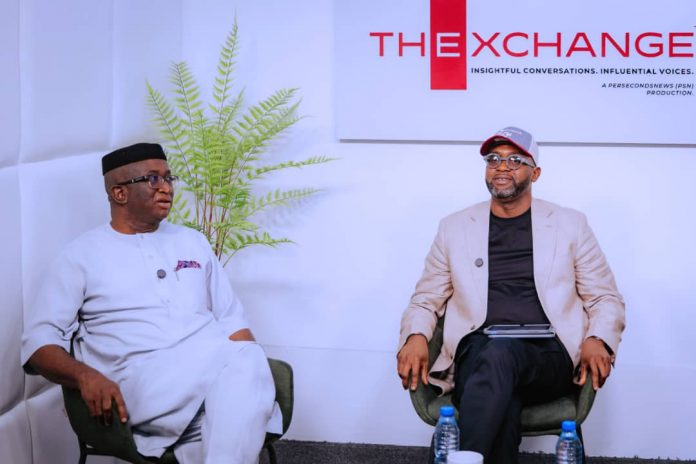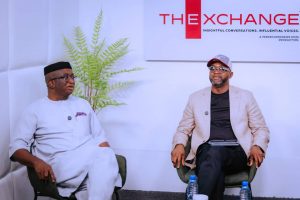Senator Victor Ndoma-Egba and Femi Soneye during “The Exchange” podcast
By Shade Damiro
Former Senate Leader and distinguished public servant, Senator Victor Ndoma-Egba, offered a profound look at Nigeria’s political evolution and the persistent challenges of governance during the inaugural episode of “The Exchange” podcast, hosted by Femi Soneye.
Reflecting on his life spanning pre- and post-independence Nigeria, the Senator described his journey as experiencing a “cocktail” of diverse, contradictory, and confusing eras—from the high hopes of 1960 to the civil war and subsequent economic booms and busts.
The discussion delved into the stark differences between the nation’s early post-independence political environment and the current landscape.
Ndoma-Egba, who was born four years before independence, noted the excitement and optimism of the 1960s, a period where the Eastern Region’s economy was described as one of the fastest growing in the world. He contrasted this with the economic realities that followed military interventions, where the national problem shifted from “not money, but how to spend it” to a struggle for money itself.
A significant point of reflection was the escalating cost of governance, an issue he recalls being debated even during his time as a Commissioner in 1984. He vividly described holding multiple critical roles—Commissioner for Works, acting Commissioner for Justice, and Chief Executive of the Directorate of Food, Roads and Rural Infrastructure (DIFRI)—due to a push to cut costs. This immense workload, he argued, was counterproductive, sacrificing efficiency and breeding the very bureaucracy that fosters corruption.
“Yes, there’s the argument for cost of government… but also at what cost?” the Senator queried, explaining that excessive consolidation of roles under the guise of cost-cutting leads to serious bureaucracy, which in turn breeds inefficiency and, opportunistically, corruption. This structural flaw, he suggests, has continually undermined the nation’s service delivery.
Turning to the challenge of building strong institutions, Ndoma-Egba rooted the difficulty in a deep-seated cultural deference to authority. He posited that the nation has become “very timid about holding authority to account,” seeing political office as an extension of traditional, unquestionable authority. This cultural milieu, coupled with a focus on “material acquisitions” by modern politicians, contrasts sharply with the austere and selfless disposition of the nation’s founding fathers.
The Senator also provided a candid assessment of the Niger Delta Development Commission (NDDC), an agency he once chaired. He criticized the abandonment of its original master plan, calling the current situation “like we are just walking in the dark, grouping.” He attributed the agency’s struggles to intense political interference and a lack of tenure certainty, where boards can be dissolved without notice.
He detailed a bizarre experience where an investigation he ordered into alleged payment corruption for contractors at the NDDC was halted by thugs who chased away the media and committee members. “NDDC, it’s a well conceived idea, very well thought out, but implementing it, so much to be done,” he stressed, advocating for an experiment in stability by allowing current officeholders to complete their full terms as stipulated by law.
Reflecting on his home state, Cross River, Ndoma-Egba expressed concern over a recent “era of experimentation” in governance, following the transformative tenures of previous administrations. He called on the current leadership to “go back and start afresh” by returning to traditional, tested forms of governance and abandoning the unsuccessful experiments.
Addressing Nigeria’s large youth population, the Senator warned that this asset could become a “curse” if the youth are not adequately educated, skilled, and empowered. He emphasized that a lack of opportunities for educated youth creates a security threat, urging the government to make deliberate, passionate policy decisions to invest in education and create opportunities.
Ultimately, Senator Ndoma-Egba encapsulated his vision for the future of Nigeria in a concise phrase: a “secure and prosperous Nigeria.” He lamented the erosion of safety and the collapse of industrial hubs, such as the once-vibrant textile and meat factories, stressing that economic revitalisation and robust security are the bedrock for the next generation’s success.


